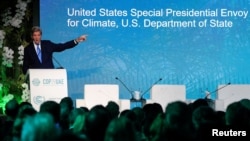Washington was joined by the African nations, Japan and other European nations in declaring that nuclear energy plays a "key role" in reaching the goal of carbon neutrality.
The use of nuclear energy as a cleaner alternative to fossil fuels is controversial as environmental groups are concerned about safety and the disposal of nuclear waste.
"We are not making the argument to anybody that this is absolutely going to be a sweeping alternative to every other energy source," U.S climate envoy John Kerry said at the COP28 conference in Dubai.
"But we know because the science and the reality of facts and evidence tell us that you can't get to net zero 2050 without some nuclear," he said.
Kerry said, "these are just scientific realities. No politics involved in this, no ideology involved in this."
The aim is to triple nuclear energy capacity by 2050 from 2020 levels.
It would be a mistake to reject nuclear power because of problems at a handful of projects, Rafael Grossi, head of the International Atomic Energy Agency said in an interview with AFP.
"There is work to do," Grossi admitted, citing the financing needs of countries that wish to extend their nuclear plants, such as Brazil, Argentina, and South Africa.
Grossi said countries tempted to take the nuclear leap, including Morocco, Senegal, Kenya and the Philippines, face similar challenges.
"There are statutes in some international lending organizations that exclude financing for nuclear," the Argentinian director general said.
"I think that is completely obsolete. It does not correspond to any scientific or technological criteria," he added.
The World Bank, for instance, has not financed a nuclear project since 1959.
"I think, and I hope there will be an evolution" in their thinking, Grossi said.
Jeff Ordower, the North America director at environmental group 350.org, differed with Kerry and Grossi.
"While we appreciate that the Biden administration is looking to invest in alternatives to fossil fuels, we don't have time to waste on dangerous distractions like nuclear energy," he said.
Other countries that signed up to the declaration include Britain, Bulgaria, Canada, the Czech Republic, Finland, France and Hungary.
Moldova, Mongolia,Netherlands, Poland, Romania, South Korea, Slovakia, Slovenia, Sweden, Ukraine and the United Arab Emirates are also on the list.








Forum